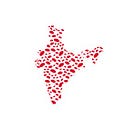The Biggest Brothel in Asia My Indian Life aired January 10, 2020- Sex Workers question BBC
Dear BBC World Service
We from http://nnswindia.org/were aghast to listen to the podcast aired on 10 January 2020 titled “The biggest brothel in Asia’ as part of My Indian Life hosted by Kalki Koechlin and produced by Ishleen Kaur.
An unaware listener could be forgiven for not realizing that Sonagachi, described breathlessly as a “weird”, “scary”, “dangerous” place in Kolkata”, is a vibrant community of children, women, men and trans persons who live and work amidst thriving businesses and innovative experiments in livelihoods, banking and public health, among many others.
For a podcast aired on the reputed platform of the BBC to be uninformed of a larger reality and rely on a single source of an anti-trafficking campaigner attached to an organisation that is “trying to change the lives” of the women is unethical and unexpected. We do not get to hear if the women targeted wish to have their lives changed. In fact, we do not hear from them at all. Therein lies the main problem of this shoddy piece of journalism: the complete absence of voices of adult sex workers. While a one-sided story might further the sensational victim narrative and amplify horror stories, there is no attempt to portray the significant efforts of sex workers’ organisations in mobilizing for rights and also carry out self-regulation to help victims of trafficking and prevent minors from entering sex work. Instead, the podcast paints an incomplete and inaccurate picture of negligent mothers and uncared for children with no fact-checking. For example, did BBC make any attempt to verify school-enrolment rate in Sonagachi and compare it with school-enrolment rate elsewhere?
If proper research had undergirded this topic, you would have doubtless come across some of these articles and we wish to bring them to your notice. Essential reading is Pat Joseph’s classic, “‘Victims Can Lie as Much as Other People’: What the Somaly Mam Scandal Says About the Media’s Treatment of Humanitarian Heroes,” The Atlantic, June 5, 2014 and the more recent “A report on the operations of Apne Aap, an anti-trafficking NGO, in Forbesganj and Kolkata” The Caravan, May 31, 2020. This might have prompted you to reach out to the sex workers, the main “subjects” of your podcast, easily accessible @https://durbar.org/. Because, one-sided biased reportage is not journalism at all, merely propaganda. The narrative in India is becoming increasingly one sided on all issues, actively encouraged by the state. You have just helped to push one more such.
Journalism about marginalized communities will remain incomplete and unethical without taking on board the politics of representation: “Nothing about us without us” is no longer a mere slogan, but must act as a moral guide to journalism. A more rounded approach, carried out with an open mind, would be more in keeping with the tenets of professional journalism, for which BBC is held in high esteem.
National Network of Sex Workers
